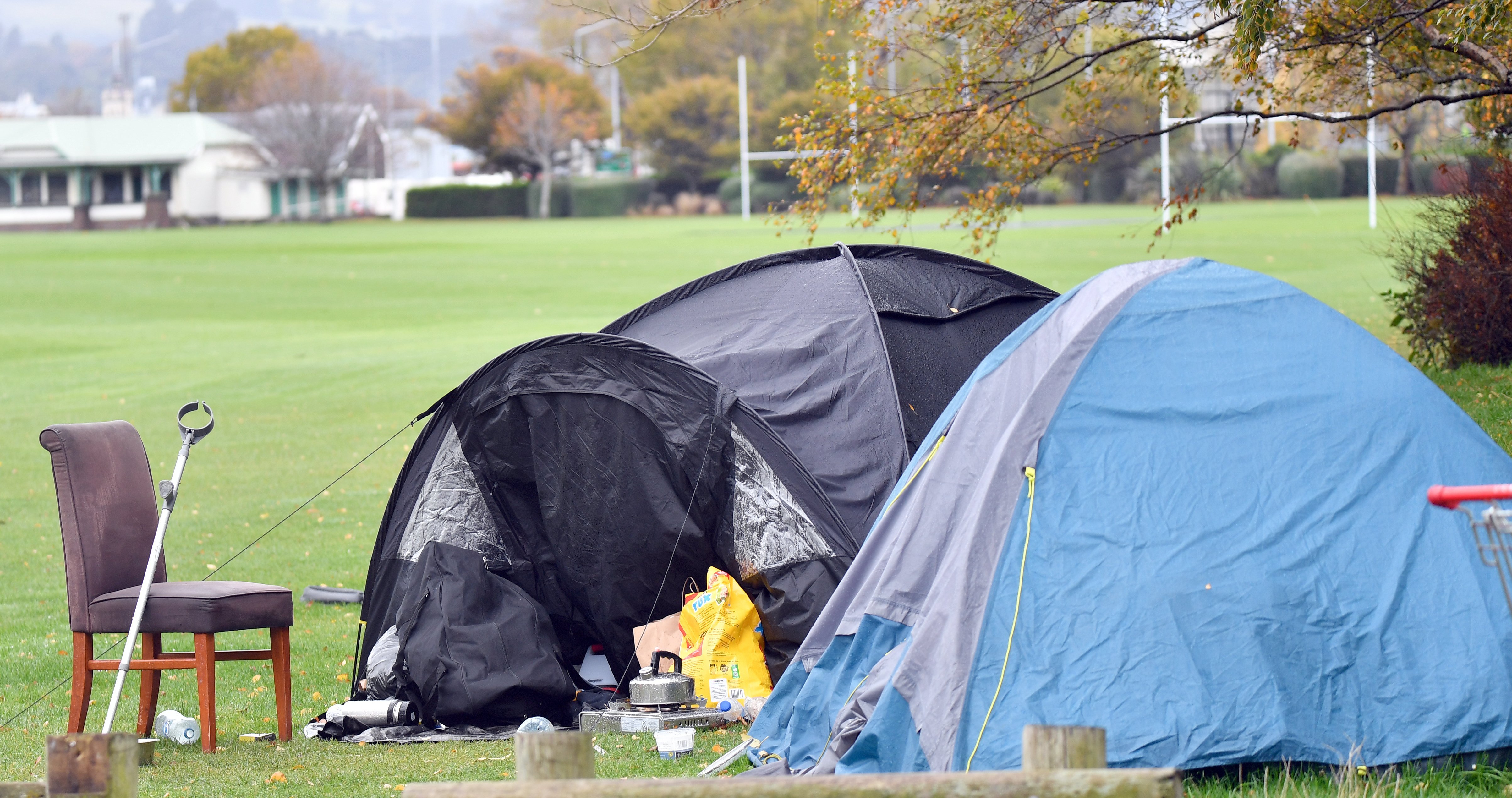
Woman with a stick
A homeless woman, Anna*, who is living at the Oval, needs a crutch to get around. She sits in squalor in a small tent, which she shares with a homeless man and a puppy.
Anna calls the man her "carer" and has to use a chair to lean on, to get off the ground.
Ministry of Social Development southern director Sue Rissman confirmed Anna had been on the waiting list for a state home for more than four years and that her "priority rating" based on needs was nearly the highest — A19. The top rating is A20.
Anna’s disability could, however, be making it harder, not easier, to get a home. State homes are allocated according to availability and suitability, not on priority rating alone, and not based on time spent on a waiting list. Ms Rissman said there was a limited supply of housing "particularly accessible housing for disabled people".
The Otago Daily Times first made contact with Anna last year, when she was living in a boarding house in a small, dark room with a broken window and shared facilities. The government definition of homelessness includes living in boarding houses.
At that time, Anna said she suffered from mental illness as well as physical disability, and listed a number of serious conditions. She had been living outside, near a church, before moving to the boarding house, she said.
Ms Rissman said Anna was at the Oval because she had been evicted from the place she was "privately renting" for having a puppy. When pressed, MSD confirmed the rental was the boarding house.
Prior to eviction, Anna had asked MSD for housing help, if she got a puppy and had no home. MSD had warned her she could not have a dog in either government-funded emergency or transitional housing.
Emergency housing is a stay of about seven nights, often in a motel. Transitional housing is contracted to charities that house people for longer and try to get people into a private rental or state home.
Ms Rissman said MSD had also warned Anna that if she got a dog in a place she was barred from having one, then she would be "unreasonably contributing to her own housing need".
A senior source in a social service charity said they were increasingly hearing MSD was blaming vulnerable people with multiple life challenges for causing their own homelessness.
The man who shares the tent with Anna said: "We have tried everything. They are not going to help us."

Man with a record
Most homeless people at the Oval are men.
One man in his 30s, Larry* said he had been in state care between the ages of seven and 16. He shared his full criminal record with the ODT. It was more than 100 offences starting from the age of 14, including theft, violence and drugs.
Larry said his criminal background kept him homeless.
"I feel targeted. I have been trying to rehabilitate, but housing is my main barrier."
MSD’s Ms Rissman said Larry had been on the waiting list for a home more than two years with a priority rating of A15. There are five priority grades above him. His rating had been higher, but was knocked back from A18 during a stay in private accommodation in Invercargill in 2022. However, since then he has had more convictions, been in prison and ended up at the Oval.
Larry, according to Ms Rissman, had been "alternately staying with family, in private accommodation and in prison. We understand he has been unable to sustain accommodation due to a range of anti-social behaviour."
There are some charities helping to house ex-prisoners, but there are barriers to them accessing the normal emergency state housing options.
Ms Rissman said a person’s criminal record does not disqualify them from receiving an emergency housing grant for a week-long stay, but "it may limit accommodation options available. Moteliers are free to choose whether they let someone stay in their motel, or refuse them."
Similarly, she said people with a criminal record were not disqualified from the transitional housing scheme run by charities.
However, MSD said the charities, who are paid by government to run the service, were "wary of accepting people with a history of offending which may impact their ability to manage the risk to themselves and other guests".
"They are generally community organisations who are also housing other vulnerable people who need to feel safe."
Larry described the Oval homeless people as largely "keeping to ourselves".
If a homeless person started interacting with children who were playing sport, Larry advised them to "pull their head in, they are kids". The homeless people sometimes threw balls back into play, he said.
Ms Rissman said MSD had given Larry money so he could leave Dunedin and travel north. He had told them he had somewhere else to stay. It is common for homeless people to move around.
Dunedin’s Night Shelter manager David McKenzie said that "people come and go at the Oval".
A building behind the shelter, normally used as transitional housing for prisoners, is now closed. It is being used as a temporary night shelter while a refurbishment and extension of the shelter building is under way.
*Names changed to protect the vulnerable.














